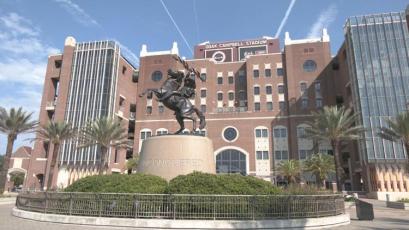
The whole world, including our idyllic community, might be refreshed by a few minutes in Matthew 7:1-5. That’s the passage where Jesus tells us, “Judge not, that you be not judged.” And where he then challenges his listeners by asking them, “Why do you see the speck that is in your brother’s eye, but do not notice the log that is in your own eye?”
People often use this passage to suggest that we shouldn’t judge anyone under any circumstances. But it’s pretty clear that’s not what Jesus had in mind. In the very next verse, for instance, he calls his adversaries dogs and pigs, and it sounds like he expects his followers to share his view. A few verses later Jesus warns us about false prophets and wolves who wear sheep’s clothing. We can easily spot them, he tells us, “by their fruits.” Which means we have to make some moral judgements, not only about what they do, but why they do it.
So, Jesus isn’t telling us to never make moral judgments, but he is telling us to be a lot less judgmental. There may be times to draw ethical and theological conclusions about others, but there is never a time to do so with a sense of superiority.
19th century theologian J.C. Ryle put it this way: “What our Lord means to condemn is a ... fault-finding spirit. A readiness to blame others for trifling offenses or matters of indifference; a habit of passing rash judgments; a disposition to magnify the errors and infirmities of our neighbors, and make the worst of them.”
If Ryle’s right, what does Jesus want us to do? And how does he want us to think about ourselves and about others?
First, he wants us to confront our own hypocrisy. Jesus is pushing us toward humility and self-awareness, says Matt Smethurst, pastor of River City Baptist Church in Richmond, Va. For example, we probably don’t want to criticize somebody for telling an off-color joke, when we’ve been known to savor a few morsels of tasty gossip. And we might want to refrain from scolding someone about how they spend their money, when we wish like crazy that our neighbor’s new Lexus was all ours.
When we lack self-awareness, we can become self-righteous, which, Smethurst says, “is the art of always being most bothered by somebody else’s sin.” It’s being preoccupied with their faults, while being blinded to our own. And that almost always affects the way we relate to others. When we’re aware of our own failings — and when we’re grieved by them — we tend to be sympathetic. We understand what people are going through. We can identify with them. But when we’re faultless in our own eyes, we tend to be more demanding. And it’s then, Jesus warns us, that we should bear in mind, “In the same way you judge others, you will be judged, and with the measure you use, it will be measured to you” (verse 2).
We’d do well, then — both now and for eternity — to tend toward mercy.
Jesus’ illustration should also motivate us to encourage people rather than criticize them. Here’s a thought exercise from Smethurst: “If you could make a list of the people you criticized last week, and a list of the people you encouraged, which would be longer?” If we were to ask our spouse, would they tell us we’re more likely to appreciate other people or look down on them?
There’s nothing hard about being critical, and it seems so harmless at the time — to casually criticize how others look, what they read, what they watch, or how they spend their time.
So, how, if it seems innocent, can we know if Jesus is talking to us, if we’re the ones who’ve been blinded? We might ask a friend if we’re a little too in love with our strongest opinions. Are we too quick to share them? Are we a bit too sure that we’re always right?
Or maybe we’re at the opposite end of the spectrum; “a Pharisee toward Pharisees,” to crib Smethurst’s phrase — someone who’s so pleased that we’re not judgmental the way others are, and who’s delighted by the fact that God made us so good.
Perhaps we’d all be better off if each of us took some time to recall that we are, together, fellow sojourners, fellow citizens, fellow sufferers and fellow sinners, too. And that all God’s people are also fellow heirs of Christ’s kingdom.
We’d surely find reason to be humble and to be more grateful for the grace Christ has given us and to gladly extend it to others.
Richard Doster lives in Fernandina Beach with his wife, Sally. He’s the editor of byFaith, the magazine of the Presbyterian Church in America, and can be reached at ddoster@icloud.com.



